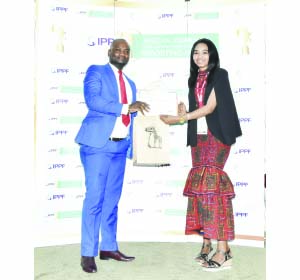
•THE author (left) receives an award from International Planned Parenthood Federation Africa Region governing council member Adama Dicko in Kigali, Rwanda. Picture courtesy of IPPFAR
From MOSES CHIMFWEMBE In Kigali, Rwanda –
YOUNG people around the world have implored global leaders to invest in quality, youth-friendly sexual and reproductive health services.
The young sexual and reproductive health advocates made their demands known at the 2018 International Conference on Family Planning (ICFP) held here from November 12 to 15.
And the donor community responded swiftly by announcing an additional funding of $350m to family planning projects in some of the world’s poorest countries.
About 30 ICFP youth leaders and family planning experts through monologues and creative storytelling illustrated the barriers young people face while trying to prevent unintended pregnancies, including misinformation, stigma and provider bias, stock-outs and high costs.
The audience comprising political leaders, researchers and more than 500 youth cheered as young advocates shared their vision for a future they plan to build.
Baye Leinyuy Bongla, an ICFP youth leader and medical doctor from Cameroon said, “I have friends who got pregnant when they were just 16 years. This experience changes your life completely. We need to start talking [about access to family planning] so fewer girls have to go through bad experiences. Isn’t it wrong to deny a person the ability to make decisions about their body and live a healthy life?”
According to new data released by the Guttmacher Institute this month, 36 million young women aged 15 to 19 in developing regions are sexually active and want to avoid pregnancy, but most are not using modern contraceptives.
The report notes that roughly half of the 9.6 million pregnancies among this group each year are unintended, and about half of these unintended pregnancies end in abortion – most of which are unsafe.
“Investing in sexual and reproductive health care that meets adolescents’ needs is critical to ensuring young people are able to make voluntary and informed choices regarding contraception and relationships,” said Dr. Ann Biddlecom, Director of International Research at the Guttmacher Institute.
“Young women and men must have access to youth-friendly contraceptive services that include the provision of a wide range of method options, as well as medically accurate counseling and information,” she added.
Meanwhile, the United Kingdom’s Department for International Development announced an investment of over $260 million in a new flagship program Women’s Integrated Sexual Health (WISH), which will ensure six million couples reliably gain access to life-saving voluntary contraception in some of the world’s poorest countries every year of the program.
Canada through the Minister of International Development, Marie-Claude Bibeau, announced up to $78.8 million in funding for projects that take a comprehensive approach to sexual and reproductive health and rights, including universal access to family planning and access to safe and legal abortion.
The Bill and Melinda Gates Foundation launched an $18 million family planning fund, managed by UNFPA Supplies, for the Ouagadougou Partnership countries (Benin, Burkina Faso, Côte d’Ivoire, Guinea, Mali, Mauritania, Niger, Senegal and Togo).
During the plenary session that featured Dr Ernesto Pernia, Economic Planning Minister of the Philippines, Annette Dixon, Vice President of Human Development at the World Bank, and Rwanda’s Minister of Finance and Economic Planning of Rwanda Dr Uzziel Ndagijimana, it was emphasised that the world was entering a critical moment where more than half of its 1.2 billion young people (aged 10 to 19) live in developing countries and many still lack access to contraceptives.
Speakers pointed out how increased access to reproductive health services could enable this generation to plan their pregnancies, thereby increasing their chances of staying in school, joining the workforce and becoming the next generation of productive adults rearing healthy families and fueling prosperous economies.
The world’s largest family planning conference wrapped up with leaders committing to ensuring every woman and girl has access to high-quality, affordable family planning information and services.
The leaders highlighted impactful programs that had driven progress toward the Family Planning 2020 (FP2020) goal of adding 120 million contraceptive users by 2020, and called for collective action to achieve universal access to sexual and reproductive health services by 2030.
Parliamentarians from 20 countries committed to ensuring the right of all individuals to access comprehensive sexual and reproductive health services while faith leaders committed to supporting quality family planning education and service delivery and to work with governments and stakeholders to enact policies that expand contraceptive access, especially among youth.
During the conference, this author scooped the runners-up prize for the International Planned Parenthood Federation (IPPF) Africa Region, African Journalist Award for the outstanding coverage and reporting on sexual and reproductive health and rights in Africa in 2017 and 2018.






